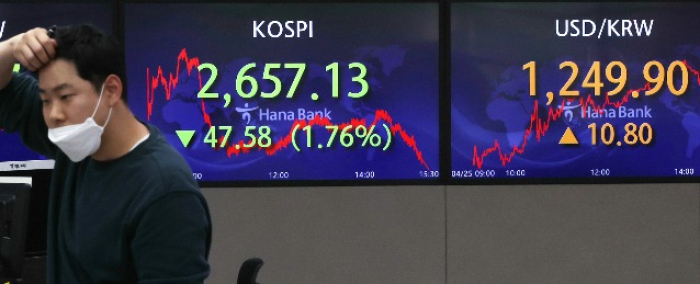Korean stock market
Foreign ownership of Korean shares hits lowest level since 2010
Investors eye global raw material exporters; Russia's exclusion from MSCI Emerging Markets Index didn't boost capital influx to Korea
By Apr 26, 2022 (Gmt+09:00)
1
Min read
Most Read
LG Chem to sell water filter business to Glenwood PE for $692 million


Kyobo Life poised to buy Japan’s SBI Group-owned savings bank


KT&G eyes overseas M&A after rejecting activist fund's offer


StockX in merger talks with Naver’s online reseller Kream


Mirae Asset to be named Korea Post’s core real estate fund operator



Foreign investors’ holding rate in South Korea’s main bourse Kospi has plunged to the lowest level since 2010. The investors have disposed of a lump sum of shares due to the rising dollar against the won and growing concerns over Kospi companies’ low performances.
Foreigners sold a net 12.8 trillion won ($10.2 billion) worth of shares in the Korean stock market, including the Kospi and the secondary bourse Kosdaq, from January 3 to April 26 of this year. Foreign ownership in the Kospi has dropped to 31%, the lowest level since September of 2009.
“Global investors are injecting capital into raw materials exporters, such as Brazil, Indonesia and Saudi Arabia. But Korea is less attractive due to its heavy reliance on imports of raw materials,” said Han Ji-Young, an analyst at Kiwoom Securities Co. “China-related funds are also attracting global investors given expectations on easing monetary policies and economic stimulus of the country,” said Han.
The market officials predicted that up to 4 trillion won would flow into the Korean stock market as MSCI announced on March 2 that it would pull Russia out of the MSCI Emerging Markets Index. Despite the announcement, foreigners went on a net selling spree disposing of Korean shares worth 450.1 billion won on March 8.
Foreigner investors will come back when the exchange rate stabilizes and corporate performances improve, market experts say. Foreign capital in the past, when the foreigners’ ownership was at the lowest level in April 2009 and January 2016, began to inflow as the dollar/won exchange rate stabilized and companies' operating profit forecasts rose.
It is unlikely that the dollar will drop below the psychologically important 1,200-won level soon as US Federal Reserve Chair Jerome Powell gave a green light to a 0.5% rate hike last week, said Han.
“If the exchange rate keeps moving with limited volatility at the current level, foreigners could return to the local stock market. Also, some major Korean corporates are posting high performances, increasing expectations of recovery momentum,” added Han.
Write to Hyeong-Gyo Seo at seogyo@hankyung.com
Jihyun Kim edited this article.
More to Read
-
 Korean stock marketForeigners sell net $4 bn of shares in March, second only to Aug. 2021
Korean stock marketForeigners sell net $4 bn of shares in March, second only to Aug. 2021Apr 01, 2022 (Gmt+09:00)
3 Min read -
 Korean stock marketAuto shares bounce back with foreigners' net buying
Korean stock marketAuto shares bounce back with foreigners' net buyingApr 14, 2022 (Gmt+09:00)
3 Min read -
 Korean stock marketTelecom stocks bullish as foreigners' net purchases increase
Korean stock marketTelecom stocks bullish as foreigners' net purchases increaseApr 12, 2022 (Gmt+09:00)
2 Min read -
 Market TrendKoreans return to foreign stock funds for bargain hunting
Market TrendKoreans return to foreign stock funds for bargain huntingMar 29, 2022 (Gmt+09:00)
2 Min read -

Comment 0
LOG IN


